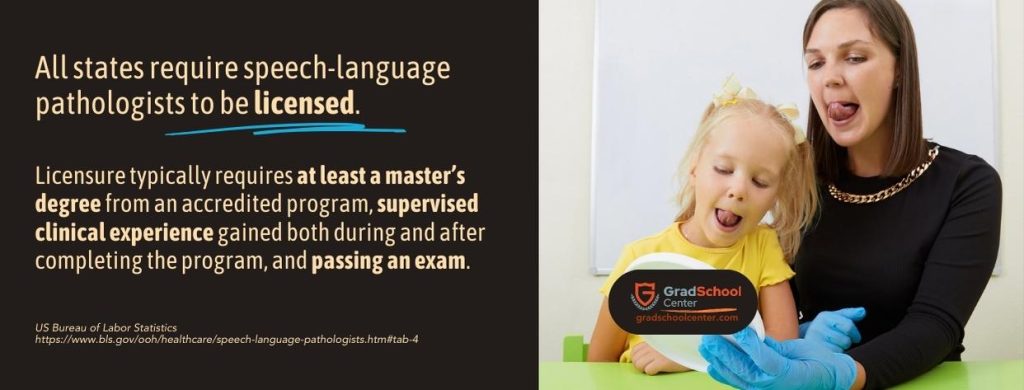What Does a Speech and Language Pathologist Do?

In this article, we will be covering...
Almost 7 million people in the United States suffer from some language or speech impairment, according to Columbus Speech and Hearing. This statistic is enough to tell you how much in demand speech and language pathologists would be. If you have the passion to help people live better lives, it’s worth pursuing a career in speech and language pathology.
The duties of a speech-language pathologist are numerous. Usually, they assess a patient’s capacity for speech, language, or swallowing. They help identify underlying issues, counsel when necessary, and create a customized treatment plan. The goal is to cure their disorder or lessen the symptoms.
Overall, they offer speech and language therapy, which can be available for all range of ages. From babies to elders, communication skills are developed and improved.
Additional Resources:
- Best Online Masters of Speech Pathology Graduate Schools
- What is the Salary of a Speech and Language Pathologist?
- What Education is Needed to Become a Speech and Language Pathologist?
What Do Speech and Language Pathologists Do

It’s essential to understand exactly what speech and language pathologists do. Before or after completing a bachelor’s degree in speech and language pathology, it pays to know what your roles and responsibilities will be as a speech expert.
As mentioned, these professionals are able to treat all age groups who suffer from any communication issues. They are able to help children with speech and language difficulties. These professionals also treat people who suffer from developmental disorders, brain injuries, cancer, and neurological disorders that make it difficult to communicate.
Here are some important roles of a speech and language pathologist:
1. Enhance communication abilities.
Speech-language pathologists assist you in improving your social communication skills. They may assist you with comprehending the social cues that influence speech, such as speaking in turns and maintaining a reasonable distance from the other person throughout a discussion.
It is particularly helpful for introverts or anti-social people who find it difficult to express themselves.
2. Improve speech.
Many elements make speeches understandable and audible. Speech and language pathologists assist in creating sounds that are easy for others to understand. Your speech will flow smoothly when you are able to piece together words, sentences, and sounds.
3. Develop a better understanding of individuals with speech and language disorders.
Speech and language pathologists also help people develop a better understanding of the people that they communicate with. You become better at understanding others and expressing yourself.
SLPs can assist you with comprehending gestures, reading materials, and conversations more thoroughly. They can assist you in expressing yourself verbally, nonverbally, and through other means.
4. Helps explore other means of communication.
Speech and language pathologists are able to provide alternative communication methods for people who are incapable of speaking or listening. Communication boards and electronic tablets are some of the communication devices that SLPs recommend to help you communicate with others.
There are also apps and other tools that speech and language pathologists help you utilize in order to communicate effectively.
5. Help patients with their swallowing.
Some people have trouble with swallowing. Fortunately, speech and language pathologists undergo training to assist with overcoming this challenge. These professionals can help you better regulate the muscles that enable you to swallow food and drink.
Speech and Language Pathology Specializations
Speech-language pathologists deal with a variety of age groups, including individuals in hospitals suffering from neurological diseases and children with developmental disabilities in schools.
SLPs may choose to get specialist certificates based on the patient group and setting. But there are three concentrations that you can pursue such as swallowing disorders, child language disorders, or fluency disorders.
Disorders or Situations Where Speech and Language Pathologists Are Helpful

Here are the different disorders or situations where people need to reach out to a speech and language pathologist:
Phonological Disorder
Speech and language pathologists can help people battle with their phonological disorder. The primary symptom of this disorder is when they can’t form sounds correctly using their muscles. Failure to do so results in broken sounds or words.
Language Disorder
SPLs can assist people who suffer from language disorders. Individuals with language difficulties find it difficult to read words and phrases aloud. And they usually have a hard time interpreting conversations with others. They find it hard to express themselves because they fear that others don’t understand them after all.
Articulation Disorder
Patients who have difficulty in forming sounds when they use speech muscles are suffering from articulation disorder. It is also something that speech and language pathologists can help with.
Cognitive-Communication Disorder
This kind of impairment has something to do with thoughts, attention span, memory, and other cognitive functions of the body. People with this disorder may have their brains processing information slower or harder than average ones.
Stuttering Disorder
Stuttering affects people who have impaired voice functions. The causes could be because of disrupted vocal cord nodules, paralyzes, or paradoxical vocal fold movement. Voice disorders are treated differently depending on their underlying cause and severity.
A speech-language pathologist can help patients manage chronic coughs, lessen symptoms, prevent worse-case scenarios, and treat conditions through therapies and training for better voice hygiene.
Social Communication Disorder
Speech and language pathologists can support anti-social people who are having social communication issues. Those who have a hard time in social situations can focus on social therapies with an SLP. They may be unable to comprehend the social cues that enable them to understand others and relate to them effectively.
Resonance Disorder
Some patients have issues with their throat, mouth, and nose, which causes their inability to communicate with others. This resonance disorder disallows the sound ways to travel through these organs when talking, which is why their voice changes.
The common symptom of this disorder is that the sound coming out of their mouth makes it sound like it came from the nasals.
Dysphagia
People with dysphagia do not control the muscles and other structures involved in swallowing. This is another condition that speech and language pathologists can help with.
Dysarthria
Dysarthria is another physical condition where your muscles become weak due to problems with the brain that hinder speaking abilities.
In addition to helping dysarthria patients slow their speech, exercise their mouth muscles, and control their voices and sounds, speech therapists can also help patients with dysarthria use augmentative and alternative communication.
Transgender Voice Therapy
For those who recently changed or have undergone transgender surgeries, speech and language pathologists can help with their voice therapies. Training your voice to align with your gender can be accomplished through this therapy conducted by SLPs.
Types of Speech and Language Pathologists
SLPs may focus on helping patients who have particular speech or swallowing issues, such as those brought on by cleft palates or brain strokes. They could also collaborate to develop treatment and care plans for patients as a team.
SLPs at hospitals, for instance, could collaborate with doctors, surgeons, and other medical professionals, whereas those in schools might do the same with educators, parents, and other caregivers.
How to Become a Licensed Speech and Language Pathologist

You may now wonder how to become a licensed speech and language pathologist. Like any other profession, it comes with requirements in education, licensure, and clinical experiences. All these are necessary to become a speech and language pathologist.
Before applying to acquire a Certificate of Clinical Competence from the American Speech-Language-Hearing Association, would-be speech and language pathologists must complete education. This may usually start with a bachelor’s degree, but a master’s degree is preferred to become a Speech-Language Pathologist. You should choose a program that comes with accreditations and a high-quality curriculum.
During the program, you must follow through with the required passing score. After completion of the program, you must also take the national exam with a passing score. These grades are usually decided based on the American Speech-Language-Hearing Association’s standards.
Bachelor’s or master’s degrees usually come with fellowship or internship requirements where they can shadow or work alongside actual speech and language pathologists. There’s a minimum number of hours required for these work experiences.
Finally, once they fulfill these, they can acquire a license, but each state comes with its requirements and terms.
When Do Families Need to See a Speech and Language Pathologist?
Whether you or your loved one suffers any difficulty mentioned below, it’s a sign to seek a speech and language pathologist’s advice:
Communication Difficulty Post-Accident or Sickness
When accidents, injuries, or illnesses happen, there are instances where these situations may cause language or speech impairment. When minor symptoms occur, it’s best to seek a speech and language pathologist right away. They provide speech therapies that allow people to carry out daily communication activities.
Challenges in Feeding Babies or Kids
Parents must be mindful of watching symptoms for babies and kids when they are fed with food or liquids. They could suffer from sensory aversions where they might find it difficult to consume specific food or drink textures. This can lead to vomiting, congestion, or gagging, which are real-time symptoms of swallowing issues.
When this happens, speech and language pathologists are helpful in performing feed therapies. This is where they train and assist children during eating times. Sensory aversion can also be overcome, and chewing, drinking, and swallowing can be taught.
Slow Speech Development
Speech and language pathologists can help you if you have concerns that your child may not be comprehending or speaking at an age-appropriate level. These professionals can assess and evaluate their speaking levels based on their age and performance.
Early therapy can be helpful when a child has speech or language difficulties.

Summary
A speech-language pathologist (SLP) may see you for a number of purposes. Speaking, swallowing, or communication difficulties can all be diagnosed and treated with the assistance of a speech-language pathologist.
If you’re worried that your child is struggling to speak or if a loved one is having communication difficulties after suffering an accident, such as a stroke, an SLP can also be of assistance. SLPs can educate you as a caregiver so you can help a loved one who has trouble swallowing or speaking.
A career in speech-language pathology is a rewarding and fulfilling choice for individuals interested in helping others communicate effectively.
Salaries can vary depending on factors such as location, education, and experience. With a growing demand for speech therapists in various settings, including schools, hospitals, and private practices, a career in speech-language pathology offers both financial stability and the opportunity to make a meaningful impact on people’s lives.
Other interesting forms of therapy designed to help others include occupational therapy, special education, ABA therapy, as well as counseling.




